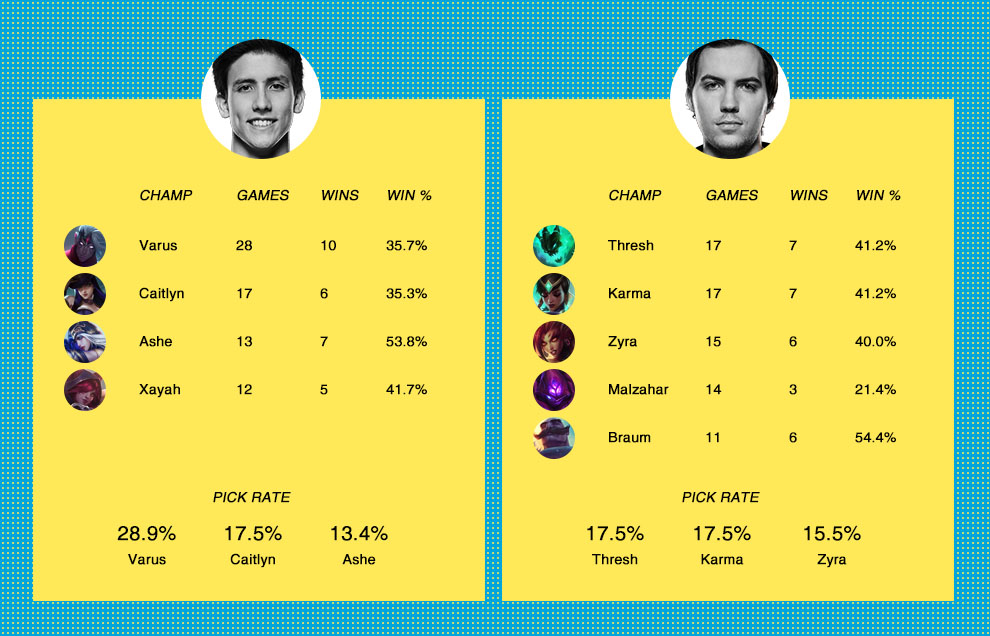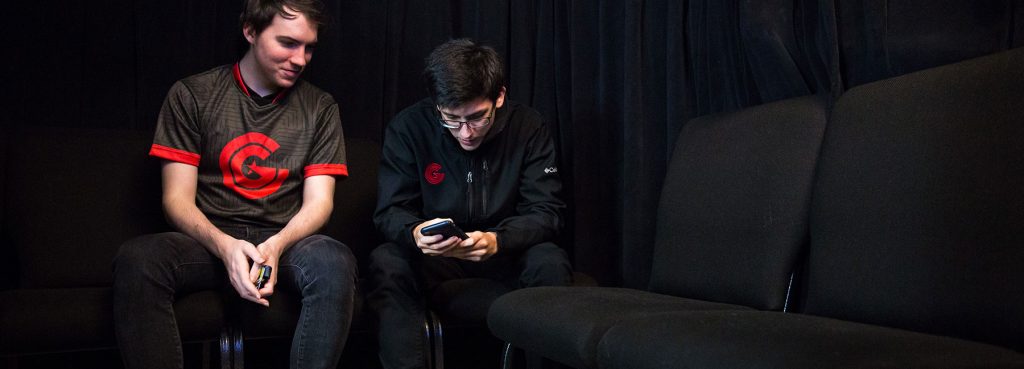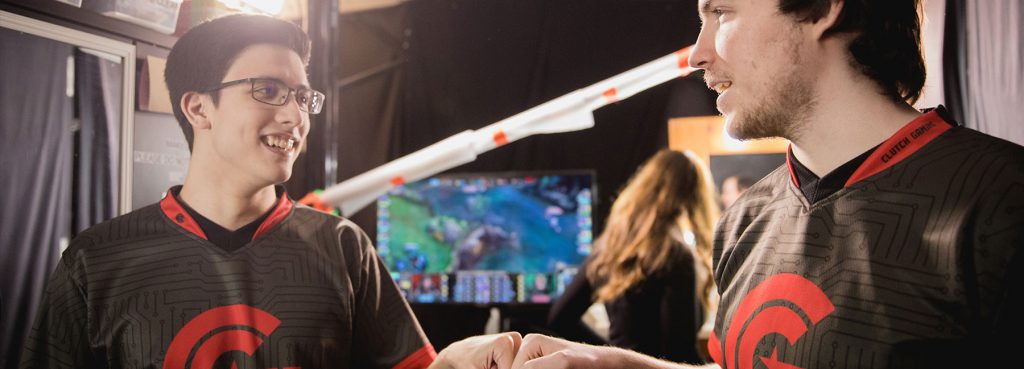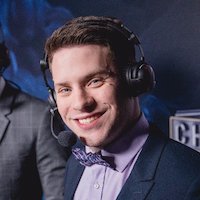“
"I've been a veteran for so long now, I realized that even though I didn't want to necessarily step up and be that voice, it was what was expected of me. So, that's what I did." - CG Apollo
Jordan and Pippen. Batman and Robin. Go on, name iconic duos in League of Legends. Chances are, even if you’re a diehard League of Legends fan, you didn’t name Apollo and Hakuho.

I would not consider myself to be a naturally great shoutcaster, but I’ve always strove to be the hardest working. When I started out, I was a young, bright-eyed League of Legends fan who just enjoyed yelling about this game that I loved. Try as I might though, my solo efforts couldn’t match the world of difference having a strong co-caster brought.
I loved shouting. He loved analysis. I was too loud, and he was too quiet. Neither of us were as good without the other there to prop us up. Pastrytime and Papa Smithy. PapaTime. Greater than the sum of our parts. I know exactly what it’s like to find a perfect partner.
That’s how I feel about Apollo and Hakuho. Two former 10th place finishers who flew more off the radar than under it. In 2017, they came together. It was a combination of one of the scene’s nicest veterans and a burgeoning support player. Together they started doing something few expected from them: winning the absolute shit out of their lane.
For the artist formerly known as “WizFujiiN,” now simply the eponymous “Apollo,” his career is littered with successful if not necessarily standout performances. He was of the old guard of marksmen players — those who just tried to be an anchor of DPS from the bot lane.

Playing since 2013 on a myriad of teams, Apollo peaked with the playoff success of the now defunct Team Impulse. Apollo is one of the scene’s quiet veterans — never a true superstar but always around. He is the embodiment of the almost derisive ADC embellishment: consistent.
Hakuho’s beginnings are similarly humble, where he played with a string of “almost made it” Challenger teams while romping through NA solo queue. He finally entered the LCS in 2016. For a then-rookie support, he made some splashes but never waves. He was a strong laner, but he also wasn’t being shoved aggressively into people’s fantasy drafts. He was decent — probably even good. But much like his future lane-mate, underrated (or not rated at all).
Clutch Gaming’s Director of Esports Sebastian Park was impressed by this experience in addition to their underrated value. He says, “Simply put, our players are journeymen. They’ve been through so much already just to get here.” The pair would serve as part of the backbone for the building of CG’s roster.
“Win lane, win game” is one of the oldest adages in League of Legends because it works. Apollo and Hakuho’s pressure-based play came to be one of their biggest strengths and became a characteristic that would outright define them, cementing this haphazard team of LCS outsiders as one of the deadliest combinations in a league stacked with talent.
For a new organization like Clutch Gaming, finding marquee players was going to be a struggle without a lavish budget over-extension, and even then, what player worth that much would play for you versus a more established organization with similarly sized pockets?
By partially adapting the analysis and analytics-focused mindset that their owners (Houston Rockets) utilized, Clutch sought to maximize value with those less visible. And if you’re gonna just run the numbers and roll with it, Clutch’s homework paid off with these two.

Statistically, 2017 all but belonged to the now Clutch Gaming duo — they had some of the best CSD, gold difference and KDA of anyone. Notably, Hakuho’s forward percentage (time in first fifteen minutes spent past the halfway point of the lane) is extremely high for a support, lending to his personal preference for stepping forward and putting heat on his opponents.

I think it’s actually remarkable just how much of a transformation Apollo went through with Hakuho. Gone for the most part were the older late-game carries and his farming lifestyle. His plowshares were replaced with swords and bows.
That type of change isn’t easy, and it’s frequently caused by an outside catalyst. I remember the first time I casted with Papa, sitting in my budget bedroom studio and just how different that first handoff felt. I was not the brains of that operation but my first open-ended question was met with a wave of analysis that the passionate, uninformed me never even thought of. We weren’t the best, but the dynamic we set for each other and the change we inspired was better than anything either of us had had prior.
For a veteran like Apollo, whose career has so long been overshadowed by his greater teammates or lost in the noise of their failures, adaptation was more of a forced product for survival than a personal preference. Paired with an incredible but wild jungler, decent if sometimes underperforming solo-laners, and perhaps most cripplingly, a lack of deep coaching infrastructure, the duo did what they needed to secure leads.
“
"I just love applying pressure in lanes. There's nothing more satisfying than just walking up in a lane and watching them back off due to the threat. I love playing those mind games." - CG Hakuho

Underrated as their talents may be, the duo often falls apart (or is relatively less successful when compared to their lane phase) in the mid and late game. I think this is partly due to the nature of their picks — if you play to smash the early game, and it works, you don’t have as many opportunities to play the late game (and thus no practice). And just from my eye test, when put in late-game situations, Apollo hasn’t yet proven he has the chops to hard carry a game with any sort of consistency.
But being so focused on grabbing leads in bot lane did wonders for their teams. They took weight off their solo-laners while simultaneously unlocking their jungler. Strategically, it was a sound progression for the two and their picks reflected that. To describe their champion pools as “top-heavy” is maybe even an understatement, but if it isn’t broken, then why change it?

It’s easy to see how their laning stats got so good when you see just how big the emphasis on lane dominance is for the pocket rockets. Varus and Caitlyn have always abused their early range and power and in the old mage Support metagame, Karma was queen of the early game poke and push races.
And for me it starts with just how good Hakuho is at threatening the opposing duo even before the first creeps crash together in the lane.
Clutch Gaming’s Head Coach David Lim sees the same thing. He says, “Hakuho is just a player that just knows how to play with pressure and priority really well. He leads that lane with his play.”

With a penchant for skillshot crowd control champions and a preference all last season for the lane-dominant mage supports, the choices in champ select matched well with the playstyle he exhibited. There’s a good reason one of his most played and favourite champions is Thresh.
“I just love applying pressure in lanes. There’s nothing more satisfying than just walking up in a lane and watching them back off due to the threat. I love playing those mind games,” he says.
It’s all about how long you think you can get away with bluffing your opponent out. The longer you wait with your hook, the more threatening you’ll be. But if you get called on that bluff, then you’ll take damage that you shouldn’t have taken. Then you must hook them to turn that scenario around.
That’s the constant “you know, I know, they know” line that Hakuho and so many other successful supports will walk when playing these kind of champions. Apollo also recognized the effect that playing a more Hakuho-style had on their overall success. He has an incredible amount of respect for his support’s talent.
“I used to be more of your typical ‘farm for late game’ carry player but since I started playing with Nick (Hakuho), we just found so much more success in being aggressive,” says Apollo.
For them it’s not just picking a strong bot lane matchup and riding the natural advantage, it’s the minutia of contesting your opponent’s CS as a duo, applying constant harassment, and playing to grow your lead slowly rather than breaking it wide open.
On the theme of Hakuho leading this lane, just watch how far up relative to his ADC that Hakuho is standing as a melee support at level one.

Apollo is barely on the screen for most of this moment as Hakuho is just storming through the GGS bot lane from the get go.
Note how practiced this simple but smooth level two harassment looks. Hakuho syncs his harassment perfectly with Apollo’s auto-attack that gives Hakuho the level advantage. For some, this might feel like a scary space to be in. But for Hakuho, being up on his opponent’s half of the lane is his happy place.
In the above game, just minutes later, Hakuho groups the bot-wave together for a flawless freeze on the minion wave while Apollo returns from base. And even though it’s a cannon wave, the two just instantly start pushing it out again — staying true to the style they’ve built as a duo. More waves pushed means more turret damage and more space for the rest of their team to breathe.
While it’s fun to play flashy and get solo kills, getting ahead in gold and opening up the map can be just as effective when you’re able to do it consistently. I like to think the unofficial Clutch Gaming bot lane motto is: “Their outer turret or nothing.”
“
"I mean simply put, our players are journeymen, they've been through so much already just to get here." - Seb Park

Bot lane will always be a dance. Hakuho takes the lead step, and Apollo always follows in-step and in your face. And out of game, Apollo recognizes what he needed to do as one of the scene’s veterans. Whether he liked it or not, he needed to be a bigger voice and force on his struggling team.
He says, “I’ve been a veteran for so long now, I realized that even though I didn’t want to necessarily step up and be that voice, it was what was expected of me, so that’s what I did.”
I can tell Apollo has gained a lot of confidence after years of play. Even though he might’ve resisted initially, leadership is part of being a veteran and whether he likes it or not, he’s taken on that responsibility.
Despite their successes, the lane is clearly not perfect. They can learn to translate their lane pressure into the teamfighting phase. Apollo also needs to blossom into a real hard carry — that’s something that his coach is hopeful for.
“I think Apollo is actually more of an alpha that you might think. I’d like to see him play even more greedy and take more resources and really evolve into an even harder carry,” says Lim.
Individually, Apollo has shown flashes of brilliance. A close duel in a sidelane. The odd aggressive killer instinct all-in. And even a run of cheeky neutral objective steals that turn a close or seemingly lost game. But I have yet to see enough real “x-factor” from him or enough consistency to point at and say that he’s a carry that can go above and beyond.

And his counterpart, Hakuho, shows an almost unreal level of raw talent and creativity. His lane pressure is the most tangible element of his play, and his teamfight instincts and playmaking are rapidly improving. More than anything though, Hakuho is lacking experience. Despite being in the league for a few years, it feels like he’s yet to find the ability to consistently hit the high notes in his play, and he also needs to learn how to win more of the map when the lane doesn’t go quite as planned.
For now, though, it’s the sum of those parts that’ll have to do the heavy lifting, and the bulk of that work is in the lane phase. Despite a huge surge in total team power since joining Clutch, both in their solo lanes and their coaching infrastructure, the whole team still needs to reach toward their ceiling and continue to push it. The talent is there. The value that Clutch gleaned in their roster exists. But it’s just going to take time to refine and reap what they have sown.
Once you’ve built that experience with someone, the value you get from that investment sometimes pays off when you least expect it. Picture the 2017 Worlds Championship Quarterfinals in a stadium drowning in sound between games. NA is doing the impossible — up 2-1 against their Chinese home-crowd opponents and on the verge of pushing themselves further than any team from the region has ever been.
I was shaking with the energy of the place during a commercial break. It’s probably the biggest moment in a series so far in my career and who else but PapaSmithy is there with a giant grin on his face just basking in the craziness of it all. Recognizing my state, he was quick with some friendly advice.
“Better figure out what you’re gonna say at the end of this game, mate,” he says, “If NA wins, it’s going to make history forever. No pressure.” NA ended up losing, but that was all the confidence I needed to close out that ridiculous set and year. Sometimes it only takes a small moment of assurance to bring clarity to something that seems so much grander than you.
For Apollo and Hakuho, perhaps they are only that small moment away from turning their good to great. From survive to thrive, they have proven that any problem can be solved with enough tactical harassment, lane priority, and a two-on-two so fluid you wonder if they’ve ever been apart. And you best believe that when the pressure’s on, they’ll be the ones applying it.
